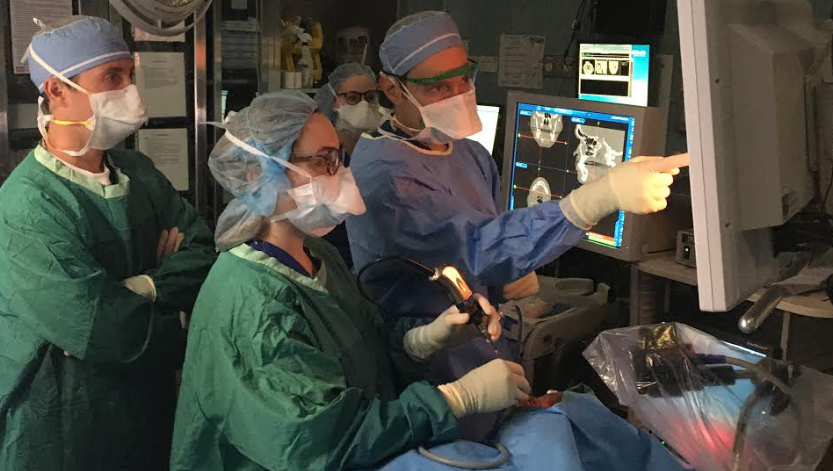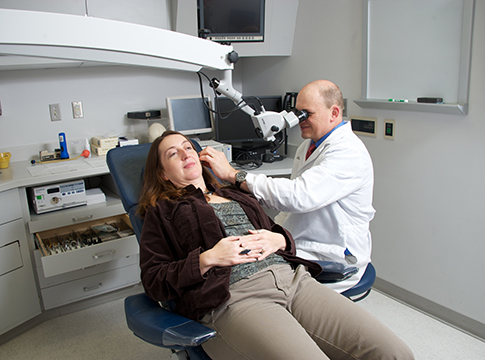Issues with Hearing? Here's When to Seek Help from a Hearing Clinic
Issues with Hearing? Here's When to Seek Help from a Hearing Clinic
Blog Article
Discovering the Area of Otolaryngology: What to Expect When You Consult an ENT
Otolaryngology, commonly described as ENT, incorporates the diagnosis and treatment of nose, ear, and throat conditions. For those experiencing relevant problems, speaking with an ENT expert can give quality and alleviation. Recognizing what to anticipate during such appointments is essential for reliable interaction and treatment. This summary will certainly lay out crucial facets of the ENT experience, consisting of common reasons for sees and the processes involved in diagnosis and treatment.

Understanding Otolaryngology: A Review
Otolaryngology, commonly referred to as ENT (Ear, throat, and nose) medicine, is a specific branch of medication that concentrates on the medical diagnosis and treatment of conditions affecting these critical locations of the body. This area incorporates a wide variety of disorders, consisting of those relevant to hearing, balance, breathing feature, and speech. Otolaryngologists are trained to manage both medical and surgical therapies, making use of innovative techniques and innovations. Their know-how expands past traditional disorders, dealing with problems such as allergic reactions, sinus infections, and hearing loss. Furthermore, they play a critical role in the monitoring of head and neck cancers cells, offering detailed treatment customized to specific patient requirements. Overall, otolaryngology remains essential for keeping health and wellness and lifestyle in affected individuals.
Usual Factors to See an ENT Professional
Several individuals seek the know-how of an ENT specialist for a variety of reasons, reflecting the varied nature of problems that impact the nose, throat, and ear. Typical issues include persistent sinus problems, which frequently leads to persistent nasal blockage and face discomfort. Allergies and their associated signs and symptoms, such as sneezing and itching, additionally trigger brows through to these specialists (Otolaryngology). Hearing loss, whether abrupt or steady, is one more significant reason for assessment. In enhancement, people may seek assessment for throat problems, including relentless hoarseness or swallowing problems. Rest apnea, characterized by disturbed breathing during sleep, is regularly resolved by ENT experts also. Each of these conditions highlights the importance of specialized care in taking care of complicated ENT-related health concerns
Getting ready for Your ENT Consultation
When getting ready for an ENT visit, it is necessary to gather relevant details and think about any certain issues. People must compile a thorough case history, including previous ear, nose, or throat concerns, surgeries, and current medications. Documenting signs-- such as period, frequency, and extent-- can give valuable understandings for the ENT professional. Additionally, individuals must prepare a listing of concerns they wish to ask, making sure that all worries are attended to throughout the browse through. Bringing along any kind of pertinent medical records or test outcomes can better help the ENT in understanding the patient's condition. Patients need to verify their visit information, including time, place, and date, to decrease any kind of final confusion. Proper preparation can improve the performance of the assessment and cause far better outcomes.
What to Expect During the Assessment
As the appointment starts, the patient can expect to take part in a complete conversation with the ENT specialist about their symptoms and medical history. The specialist will ask regarding the duration, frequency, and intensity of signs and symptoms such as hearing loss, nasal blockage, or aching throat. In addition, the individual's previous clinical problems, medicines, and any type of pertinent household history will be evaluated, aiding the professional in developing a complete understanding of the patient's health and wellness. The ENT may additionally ask concerning lifestyle variables, such as exposure to irritants or irritants. This open discussion establishes a structure for the consultation, guaranteeing that the client's concerns are dealt with and establishing the stage for any type of needed examinations or suggestions for therapy.
Analysis Tests and Procedures in Otolaryngology
A series of diagnostic tests and procedures are essential in otolaryngology to precisely evaluate and identify problems affecting the ear, nose, and throat. Usual examinations consist of audiometry, which measures hearing function, and tympanometry, examining middle ear pressure. Nasal endoscopy permits visualization of the nasal passages and sinuses, while laryngoscopy takes a look at the throat and singing cords. Imaging techniques, such as CT scans and MRIs, give comprehensive sights of head and neck structures. Allergic reaction screening might likewise be performed to determine triggers for sinus or respiratory system issues. These analysis tools enable ENT specialists to create a detailed understanding of patients' problems, making certain customized and reliable monitoring strategies. Correct diagnosis is important for effective therapy end results in otolaryngology.
Treatment Options Used by ENT Specialists
ENT professionals offer a selection of treatment alternatives tailored to resolve details problems affecting the ear, nose, and throat. These therapies range from conservative techniques, such as drug and way of life alterations, to more invasive procedures. Allergic reactions may be handled with antihistamines or immunotherapy, while persistent sinus problems could require nasal corticosteroids or sinus surgical treatment. For hearing loss, ENT more info specialists commonly advise listening device or surgical interventions like cochlear implants. In cases of throat conditions, alternatives can include speech treatment or surgeries to get rid of blockages. Additionally, they might give assistance for handling rest apnea, consisting of the use of CPAP tools or medical interventions. Generally, the objective is to boost individuals' top quality of life through customized care and reliable therapy approaches.
When to Seek Follow-Up Treatment With an ENT
When to seek follow-up treatment with an ENT professional is important for taking care of ongoing symptoms or difficulties related to throat, nose, and ear problems, acknowledging. People must take into consideration arranging a follow-up consultation if signs and symptoms persist regardless of initial treatment, such as chronic ear pain, nasal blockage, or throat discomfort. Adjustments in hearing, balance problems, or unusual nasal discharge may likewise necessitate further evaluation. Furthermore, if a client experiences adverse effects from recommended medications or has undergone a procedure, follow-up treatment is very important to monitor recuperation and resolve any kind of concerns. Timely examinations can ensure reliable monitoring of problems, stop possible complications, and provide assurance concerning one's wellness. Looking for follow-up treatment advertises proactive wellness management in otolaryngology.
Often Asked Concerns

What Certifications Should I Look for in an ENT Professional?
When seeking an ENT expert, one should look for board accreditation, appropriate experience, and solid client testimonials. Furthermore, reliable communication abilities and a compassionate technique can substantially enhance the total treatment experience.
How Do I Select the Right ENT for My Needs?
Choosing the right ENT specialist includes assessing their credentials, experience, and client testimonials (Sinus). It is important to ponder their communication style and approach to treatment, ensuring they straighten with the person's particular health and wellness requirements and preferences
Exist Any Kind Of Dangers Connected With ENT Procedures?
The threats connected with ENT procedures may include infection, bleeding, anesthesia complications, and prospective damages to bordering structures. Patients should talk about these dangers with their medical professional to recognize individual concerns and assurance notified choices.
How Can I Handle Anxiousness Prior To My ENT Consultation?
To handle stress and anxiety before a consultation, individuals can exercise deep breathing workouts, visualize favorable results, prepare concerns ahead of time, and seek support from pals or family, cultivating a sense of confidence and peace.
What Should I Do if I Experience Side Effects From Treatment?
If negative effects from treatment happen, the person must quickly report them to their doctor. Modifications to therapy or added interventions may be needed to guarantee safety and security and effectiveness in handling their condition - ENT. As the assessment starts, the person can expect to engage in a comprehensive discussion with the ENT professional about their signs and clinical background. These diagnostic tools allow ENT specialists to create a thorough understanding of people' conditions, ensuring customized and efficient monitoring strategies. ENT professionals supply a variety of therapy alternatives tailored to address certain problems influencing the throat, ear, and nose. When seeking an ENT specialist, one ought to look for board certification, pertinent experience, and solid patient testimonials. Choosing the best ENT specialist involves reviewing their credentials, experience, and client testimonials
Report this page